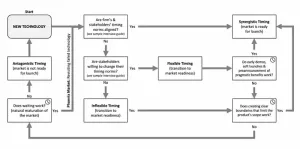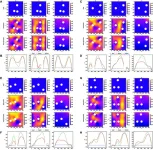(Press-News.org) Virtual reality (VR) video games that combine screen time with exercise are a great way to get fit, but game designers face a major challenge – like with regular exercise, adherence to ‘exergames’ is low, with most users dropping out once they start to feel uncomfortable or bored.
Computer scientists at the University of Bath believe they’ve found a solution: create exergames that use sensors to continuously measure a person’s emotional state while they exercise, then tweak the game – for instance, making it easier or harder – to keep the user engaged.
Dr Dominic Potts, lead author of a new study into harnessing cutting-edge sensor technology to keep exercisers motivated, said: “When it comes to physical exercise in all forms, motivation and exercise adherence are huge problems. With exergaming, we can address this issue and maximise a person’s enjoyment and performance by adapting the challenge level to match a user’s abilities and mood.
“Exercise games that are completely adaptive will sense a person's emotions and give them more ‘rewards’ when they’re struggling and more obstacles when they’re ready for a new challenge.”
Game designers have long aspired to develop more personalised exergames – i.e. programs that tune in to a person as they work out, adapting to their struggles and ambitions of the game unfolds – however, finding a trustworthy method for measuring a user’s evolving emotional state has proven elusive.
The Bath team has made a breakthrough by employing a novel range of sensors – which could be embedded in VR headsets and wearable devices such as smartwatches – to track physical changes experienced by an exerciser as they work out.
The team’s findings were published recently at the CHI Conference on Human Factors in Computing Systems – the premier international conference of Human-Computer Interaction (HCI), where the paper received an honourable mention award.
The researchers hope their findings will be adopted by game designers to create immersive programs that can keep a person peddling, running or weightlifting long after they’d normally choose to quit.
Background noise
Until now, sensors – which can be extremely effective at tracking emotional states when a person is sedentary – have proven unreliable at measuring the emotional landscape of a person involved in physical activity, making it hard to recognise if a person is experiencing happiness, stress of boredom.
“Traditionally, these sensing devices have been put into VR headsets to track blinks and pupil dilation, but generally they are highly susceptible to physiological and background noise,” explained Dr Potts.
Unwanted ‘noise’ is generated in two ways: by a person moving in unpredictable ways – as they often do when exercising – and by the exerciser responding to the virtual environment (VE) they’re immersed in. So, for instance, a sensor that shows a person’s pupils dilating as they exercise might reflect luminosity changes in the VE rather than the user’s evolving emotional state.
Reliable tracking
In the new study, 72 participants were involved in a VR static bike race while the Bath scientists used a specific combination of sensors to measure pupil size, facial expressions, heart rate, levels of sweating, skin inflammation and electrodermal activity (which measures the skin’s ability to conduct electricity, reflecting stress levels).
Data was collected through the sensors while racers worked out in four distinct VEs, where each environment was designed to induce a specific emotion (happiness, sadness, stress, and calmness). Participants moved through these VEs at three different exercise intensities (low, medium, and high).
For each workout, the researchers were able to paint an accurate picture of a user’s emotional state, matching the game’s level of difficulty and the nature of the VE with the physiological changes experienced by the user, as picked up by their sensors.
Drawing from this research, eight guidelines have been formulated for creators of VR exergame, aimed at enhancing the emotional engagement of users. Among these recommendations are the following:
Pupil-detecting sensors should be designed to correct for luminosity changes in the virtual environment.
Preexisting sweat levels of a user should be taken into account to predict stress and arousal of the nervous system.
Sensor data should be cleaned before and during an exergame (i.e. removing signals unrelated to emotional changes) to measure interpersonal differences and enable the game to be tailored to each user.
Multiple physiological sensors should be used to improve predictions of a user’s emotional state.
Dr Christof Lutteroth, who leads exergame research as director of the REVEAL research centre and is co-investigator at CAMERA, both based at the University of Bath, said: “In the long run, our objective is to make VR exercise emotionally intelligent.
“We fully expect VR physical activity to explode in popularity in the years ahead – school children are already using them as part of their exercise programmes and they are also being used in rehab and sports science – so it’s important to focus on making technology that’s emotionally intelligent and adaptive to differences between users.”
The University of Bath research team for this study included: Dr Dominic Potts, Masters student Zoe Broad, Psychology undergraduate Tarini Sehgal, Joseph Hartley, Professor Eamonn O'Neill, Dr Crescent Jicol, Dr Christopher Clarke and Dr Christof Lutteroth.
Link to video explainer: https://youtu.be/P_AXa4Lb1UU?si=tCkhFxPAcN7gNH2f
END
Can technology turn exercise pain into pleasure?
Most exercisers stop VR 'exergaming' when the program gets too tough or dull - could sensors that tune into a person's emotional state reverse low adherence?
2024-09-03
ELSE PRESS RELEASES FROM THIS DATE:
When is the right time to launch new technologies?
2024-09-03
New research from Bayes Business School (formerly Cass) finds that being on the cutting edge of technology is not enough to ensure success in the market, and managers must strategically time launches to create a source of opportunity and credibility for the firm.
The study, led by Dr Thomas Robinson, Senior Lecturer in Marketing at Bayes, with Dr Ela Veresiu, Associate Professor of Marketing at Schulich School of Business, York University, Toronto, develops a framework for guiding organisations on the best situations for a product launch.
The research identifies four timing situations that can confront marketing managers. Knowing ...
Mayo researchers develop tool that measures health of a person’s gut microbiome
2024-09-03
ROCHESTER, Minn. — A team of Mayo Clinic researchers has developed an innovative computational tool that analyzes the gut microbiome, a complex ecosystem of trillions of bacteria, fungi, viruses and other microorganisms within the digestive system, to provide insights into overall well-being.
In a new study published in Nature Communications, the tool demonstrated at least 80% accuracy in differentiating healthy individuals from those with any disease. The tool was developed by analyzing ...
Unveiling the molecular mechanisms linking aging with neurodegenerative diseases
2024-09-03
Tokyo Medical and Dental University (TMDU) researchers elucidate the role of PQBP3 in stabilizing the nuclear membrane and its relationship to senescence and neurodegeneration
Tokyo, Japan – Aging is the prime cause of neurodegenerative diseases, such as Alzheimer’s disease, Parkinson's disease, and amyotrophic lateral sclerosis. But what exactly increases the prevalence of these brain disorders as one grows older? The molecular forces linking aging, cellular senescence, and the onset of these neurodegenerative conditions ...
Keep devices out of bed for better sleep – Otago study
2024-09-03
Despite what we’ve been led to believe, the timing of evening screen use, rather than the activity itself, negatively impacts youth sleep, a University of Otago study has found.
Current sleep guidelines recommend no screen use in the hour or two before bed. However, the researchers found screen time in the two hours before bed had little impact on youth sleep, it was screen time once in bed that caused problems.
Lead author Dr Bradley Brosnan, of the Edgar Diabetes and Obesity Research Centre, says screen time is a mainstay in adolescents’ bedtime routines, and sleep guidelines need to be revaluated to better reflect modern life.
Published in JAMA Pediatrics, ...
Dr. Torabi to study vulnerabilities in electric vehicle charging management systems
2024-09-03
Dr. Sadegh Torabi, Assistant Professor, Information Sciences and Technology, College of Engineering and Computing (CEC), and Research Fellow at the Center for Secure Information Systems (CSIS), is set to receive funding for the project: “Collaborative Research: CISE MSI: RPEP: OAC: Macroscopic and Microscopic Inference and Analysis of Vulnerabilities within EV Charging-Management Systems.”
Via this project, Dr. Torabi and his partners will establish a collaborative ecosystem among academia, industry, and the public sector to bolster the resilience of the EV Charging Infrastructure (CI). The critical nature of EV CI has made them targets for malicious attacks, often state-sponsored, ...
Think simpler, flow faster
2024-09-03
Analyzing and simulating fluid flow is a challenging mathematical problem that impacts various scenarios, including video game engines, ocean current modeling and hurricane forecasting. The core of this challenge lies in solving the Navier–Stokes equations, a set of classical equations that describe fluid dynamics. Recently, deep learning has emerged as a powerful tool to accelerate equation solving. Using this technique, a team designed a novel approach that can provide accurate solutions 1,000 times faster than traditional equation solvers. The team’s study was published June 26 in Intelligent ...
Eating fish but not omega-3 supplements during pregnancy associated with lower likelihood of autism diagnosis, NIH-funded study finds
2024-09-03
Eating any amount of fish during pregnancy was associated with about a 20% lower likelihood of autism spectrum disorder (ASD) diagnosis, particularly in females, and a slight reduction in autism-related traits in offspring, according to a new study funded by the Environmental influences on Child Health Outcomes (ECHO) Program at the National Institutes of Health.
However, researchers did not find the same association with supplements containing omega-3 fatty acids.
Fish is an important source of omega-3 fatty acids, an essential nutrient during pregnancy for supporting maternal health and child neurodevelopment. A recent analysis of ECHO Cohort data revealed that about ...
Study: racial and ethnic designation inaccuracies in children’s medical records may impede equity efforts
2024-09-03
ANN ARBOR, Mich. – Leaders at three Michigan hospitals aiming to address equity issues for pediatric patients wanted to start with inspecting data key to identifying potential inequities.
What they learned: much of those data are inaccurate.
A study from the Michigan Child Health Equity Collaborative, or Mi-CHEC, found substantial errors across the three health systems in racial and ethnic designations in their electronic medical records. Accuracy of these designations are important to clinical care improvement ...
Penn study finds taking semaglutide for weight management does not increase risk of depression or suicidal behavior in people without known major psychopathology
2024-09-03
PHILADELPHIA— Taking the weight loss medication semaglutide did not increase the risk of depressive symptoms, suicidal thoughts, or suicidal behavior in persons without known major mental health disorders, according to a new study led by researchers from the Perelman School of Medicine at the University of Pennsylvania published this week in JAMA Internal Medicine. Both the Food and Drug Administration (FDA) and the European Medicines Agency are actively monitoring the psychiatric safety of semaglutide and similar medications after post marketing surveillance reports of depression, suicidal thoughts (ideation), ...
GLP-1 receptor agonist use and risk of suicide death
2024-09-03
About The Study: This cohort study, including mostly patients with type 2 diabetes, does not show an association between use of glucagon-like peptide-1 (GLP-1) receptor agonists and an increased risk of suicide death, self-harm, or incident depression and anxiety-related disorders.
Corresponding Author: To contact the corresponding author, Peter Ueda, MD, PhD, email peter.ueda@ki.se.
To access the embargoed study: Visit our For The Media website at this link https://media.jamanetwork.com/
(doi:10.1001/jamainternmed.2024.4369)
Editor’s ...
LAST 30 PRESS RELEASES:
University of Ottawa Heart Institute, the University of Ottawa and McGill University launch ARCHIMEDES to advance health research in Canada
The world’s largest brain research prize awarded for groundbreaking discoveries on how we sense touch and pain
Magnetofluids help to overcome challenges in left atrial appendage occlusion
Brain-clearing cells offer clues to slowing Alzheimer’s disease progression
mRNA therapy restores fertility in genetically infertile mice
Cloaked stem cells evade immune rejection in mice, pointing to a potential universal donor cell line
Growth in telemedicine has not improved mental health care access in rural areas, study finds
Pitt scientists engineer “living eye drop” to support corneal healing
Outcomes of older adults with advanced cancer who prefer quality of life vs prolonging survival
Lower music volume levels in fitness class and perceived exercise intensity
Of crocodiles, counting and conferences
AERA announces 2026 award winners in education research
Saving two lives with one fruit drop
Photonic chips advance real-time learning in spiking neural systems
Share of migratory wild animal species with declining populations despite UN treaty protections worsens from 44% to 49% in two years; 24% face extinction, up 2%
One in 20 babies experiences physical abuse, global review finds
Tundra tongue: The science behind a very cold mistake
Targeting a dangerous gut infection
Scientists successfully harvest chickpeas from “moon dirt”
Teen aggression a warning sign for faster aging later in life
Study confirms food fortification is highly cost-effective in fighting hidden hunger across 63 countries
Special issue elevates disease ecology in marine management
A kaleidoscope of cosmic collisions: the new catalogue of gravitational signals from LIGO, Virgo and KAGRA
New catalog more than doubles the number of gravitational-wave detections made by LIGO, Virgo, and KAGRA observatories
Antifibrotic drug shows promise for premature ovarian insufficiency
Altered copper metabolism is a crucial factor in inflammatory bone diseases
Real-time imaging of microplastics in the body improves understanding of health risks
Reconstructing the world’s ant diversity in 3D
UMD entomologist helps bring the world’s ant diversity to life in 3D imagery
ESA’s Mars orbiters watch solar superstorm hit the Red Planet
[Press-News.org] Can technology turn exercise pain into pleasure?Most exercisers stop VR 'exergaming' when the program gets too tough or dull - could sensors that tune into a person's emotional state reverse low adherence?



